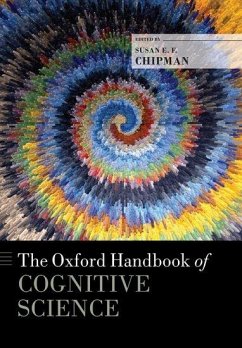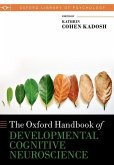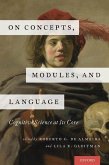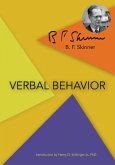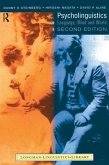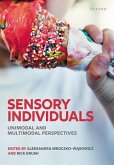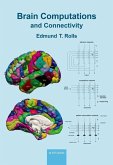Oxford Handbook of Cognitive Science
Herausgeber: Chipman, Susan E F
Oxford Handbook of Cognitive Science
Herausgeber: Chipman, Susan E F
- Gebundenes Buch
- Merkliste
- Auf die Merkliste
- Bewerten Bewerten
- Teilen
- Produkt teilen
- Produkterinnerung
- Produkterinnerung
The Oxford Handbook of Cognitive Science emphasizes the research and theory most central to modern cognitive science: computational theories of complex human cognition. Additional facets of cognitive science are discussed in the handbook's introductory chapter.
Andere Kunden interessierten sich auch für
![The Oxford Handbook of Developmental Cognitive Neuroscience The Oxford Handbook of Developmental Cognitive Neuroscience]() The Oxford Handbook of Developmental Cognitive Neuroscience269,99 €
The Oxford Handbook of Developmental Cognitive Neuroscience269,99 €![On Concepts, Modules, and Language On Concepts, Modules, and Language]() On Concepts, Modules, and Language108,99 €
On Concepts, Modules, and Language108,99 €![Verbal Behavior Verbal Behavior]() B. F. SkinnerVerbal Behavior32,99 €
B. F. SkinnerVerbal Behavior32,99 €![Psycholinguistics Psycholinguistics]() Danny SteinbergPsycholinguistics204,99 €
Danny SteinbergPsycholinguistics204,99 €![Sentence First, Arguments Afterward Sentence First, Arguments Afterward]() Lila GleitmanSentence First, Arguments Afterward143,99 €
Lila GleitmanSentence First, Arguments Afterward143,99 €![Sensory Individuals Sensory Individuals]() Sensory Individuals155,99 €
Sensory Individuals155,99 €![Brain Computations and Connectivity Brain Computations and Connectivity]() Edmund T RollsBrain Computations and Connectivity184,99 €
Edmund T RollsBrain Computations and Connectivity184,99 €-
-
-
The Oxford Handbook of Cognitive Science emphasizes the research and theory most central to modern cognitive science: computational theories of complex human cognition. Additional facets of cognitive science are discussed in the handbook's introductory chapter.
Hinweis: Dieser Artikel kann nur an eine deutsche Lieferadresse ausgeliefert werden.
Hinweis: Dieser Artikel kann nur an eine deutsche Lieferadresse ausgeliefert werden.
Produktdetails
- Produktdetails
- Verlag: Hurst & Co.
- Seitenzahl: 392
- Erscheinungstermin: 8. Dezember 2016
- Englisch
- Abmessung: 261mm x 185mm x 30mm
- Gewicht: 911g
- ISBN-13: 9780199842193
- ISBN-10: 0199842191
- Artikelnr.: 47870734
- Herstellerkennzeichnung
- Libri GmbH
- Europaallee 1
- 36244 Bad Hersfeld
- gpsr@libri.de
- Verlag: Hurst & Co.
- Seitenzahl: 392
- Erscheinungstermin: 8. Dezember 2016
- Englisch
- Abmessung: 261mm x 185mm x 30mm
- Gewicht: 911g
- ISBN-13: 9780199842193
- ISBN-10: 0199842191
- Artikelnr.: 47870734
- Herstellerkennzeichnung
- Libri GmbH
- Europaallee 1
- 36244 Bad Hersfeld
- gpsr@libri.de
Susan Chipman, PhD, managed the Cognitive Science program at the U.S. Office of Naval Research for 22 years. Previously, she was Assistant Director of the National Institute of Education, where she was responsible for research programs in mathematics education, cognitive development, and computers in education. Educated at Harvard, she is a Fellow of both APA and APS and was named an honorary lifetime member of the Cognitive Science Society in recognition of her contributions to the field.
* An Introduction to Cognitive Science
* Susan E.F. Chipman
* Part I: The New Computational Psychology: Cognitive Architectures and
the Computational Modeling of Cognition
* 1. ACT-R and Beyond
* Dario D. Salvucci
* 2. A Summary of the EPIC Cognitive Architecture
* David E. Kieras
* 3. The CAPS Family of Cognitive Architectures
* Sashank Varma
* 4. Connectionism and the Emergence of Mind
* Stephen J. Flusberg and James L. McClelland
* 5. The Lebra Cognitive Architecture: How to Play 20 Principles with
Nature and Win!
* Randall C. O'Reilly, Thomas E. Hazy, and Seth A. Heard
* 6. The CLARION cognitive architecture: Toward a comprehensive theory
of the mind
* Ron Sun
* Part II: Cognitive Science Perspectives on Classic Problems in
Psychology
* 7. Concepts, Meaning, and Conceptual Relationships
* Bradley C. Love
* 8. An Integrative Account of Psychological Time
* Hedderik van Rijn and Neils A. Taatgen
* 9. The Central Questions of Spatial Cognition
* Allison S. Liu and Christian D. Schunn
* 10. Causal relations: Kant, Unity and Diversity
* Clayton Lewis
* 11. The Cognitive Science Approach to Learning and Memory
* Matthew M. Walsh and Marsha C. Lovett
* 12. Problem Solving
* Stephen K. Reed
* 13. Decision Making: A Cognitive Science Perspective
* Cleotilde Gonzalez
* 14. What Brain Imaging Reveals About the Nature of Multitasking
* Marcel Adam Just and Augusto Buchweitz
* Part III: The Cognitive Science of Language
* 15. Cognitive Linguistics
* Vyvyan Evans
* 16. WordNet: An Electronic Lexical Resource
* Christiane Fellbaum
* 17. VerbNet: Capturing English Verb Behaviour, Meaning and Usage
* Martha Palmer, Claire Bonial, and Jena D. Hwang
* 18. Natural Language Processing
* Sergei Nirenburg and Majorie J. McShane
* Susan E.F. Chipman
* Part I: The New Computational Psychology: Cognitive Architectures and
the Computational Modeling of Cognition
* 1. ACT-R and Beyond
* Dario D. Salvucci
* 2. A Summary of the EPIC Cognitive Architecture
* David E. Kieras
* 3. The CAPS Family of Cognitive Architectures
* Sashank Varma
* 4. Connectionism and the Emergence of Mind
* Stephen J. Flusberg and James L. McClelland
* 5. The Lebra Cognitive Architecture: How to Play 20 Principles with
Nature and Win!
* Randall C. O'Reilly, Thomas E. Hazy, and Seth A. Heard
* 6. The CLARION cognitive architecture: Toward a comprehensive theory
of the mind
* Ron Sun
* Part II: Cognitive Science Perspectives on Classic Problems in
Psychology
* 7. Concepts, Meaning, and Conceptual Relationships
* Bradley C. Love
* 8. An Integrative Account of Psychological Time
* Hedderik van Rijn and Neils A. Taatgen
* 9. The Central Questions of Spatial Cognition
* Allison S. Liu and Christian D. Schunn
* 10. Causal relations: Kant, Unity and Diversity
* Clayton Lewis
* 11. The Cognitive Science Approach to Learning and Memory
* Matthew M. Walsh and Marsha C. Lovett
* 12. Problem Solving
* Stephen K. Reed
* 13. Decision Making: A Cognitive Science Perspective
* Cleotilde Gonzalez
* 14. What Brain Imaging Reveals About the Nature of Multitasking
* Marcel Adam Just and Augusto Buchweitz
* Part III: The Cognitive Science of Language
* 15. Cognitive Linguistics
* Vyvyan Evans
* 16. WordNet: An Electronic Lexical Resource
* Christiane Fellbaum
* 17. VerbNet: Capturing English Verb Behaviour, Meaning and Usage
* Martha Palmer, Claire Bonial, and Jena D. Hwang
* 18. Natural Language Processing
* Sergei Nirenburg and Majorie J. McShane
* An Introduction to Cognitive Science
* Susan E.F. Chipman
* Part I: The New Computational Psychology: Cognitive Architectures and
the Computational Modeling of Cognition
* 1. ACT-R and Beyond
* Dario D. Salvucci
* 2. A Summary of the EPIC Cognitive Architecture
* David E. Kieras
* 3. The CAPS Family of Cognitive Architectures
* Sashank Varma
* 4. Connectionism and the Emergence of Mind
* Stephen J. Flusberg and James L. McClelland
* 5. The Lebra Cognitive Architecture: How to Play 20 Principles with
Nature and Win!
* Randall C. O'Reilly, Thomas E. Hazy, and Seth A. Heard
* 6. The CLARION cognitive architecture: Toward a comprehensive theory
of the mind
* Ron Sun
* Part II: Cognitive Science Perspectives on Classic Problems in
Psychology
* 7. Concepts, Meaning, and Conceptual Relationships
* Bradley C. Love
* 8. An Integrative Account of Psychological Time
* Hedderik van Rijn and Neils A. Taatgen
* 9. The Central Questions of Spatial Cognition
* Allison S. Liu and Christian D. Schunn
* 10. Causal relations: Kant, Unity and Diversity
* Clayton Lewis
* 11. The Cognitive Science Approach to Learning and Memory
* Matthew M. Walsh and Marsha C. Lovett
* 12. Problem Solving
* Stephen K. Reed
* 13. Decision Making: A Cognitive Science Perspective
* Cleotilde Gonzalez
* 14. What Brain Imaging Reveals About the Nature of Multitasking
* Marcel Adam Just and Augusto Buchweitz
* Part III: The Cognitive Science of Language
* 15. Cognitive Linguistics
* Vyvyan Evans
* 16. WordNet: An Electronic Lexical Resource
* Christiane Fellbaum
* 17. VerbNet: Capturing English Verb Behaviour, Meaning and Usage
* Martha Palmer, Claire Bonial, and Jena D. Hwang
* 18. Natural Language Processing
* Sergei Nirenburg and Majorie J. McShane
* Susan E.F. Chipman
* Part I: The New Computational Psychology: Cognitive Architectures and
the Computational Modeling of Cognition
* 1. ACT-R and Beyond
* Dario D. Salvucci
* 2. A Summary of the EPIC Cognitive Architecture
* David E. Kieras
* 3. The CAPS Family of Cognitive Architectures
* Sashank Varma
* 4. Connectionism and the Emergence of Mind
* Stephen J. Flusberg and James L. McClelland
* 5. The Lebra Cognitive Architecture: How to Play 20 Principles with
Nature and Win!
* Randall C. O'Reilly, Thomas E. Hazy, and Seth A. Heard
* 6. The CLARION cognitive architecture: Toward a comprehensive theory
of the mind
* Ron Sun
* Part II: Cognitive Science Perspectives on Classic Problems in
Psychology
* 7. Concepts, Meaning, and Conceptual Relationships
* Bradley C. Love
* 8. An Integrative Account of Psychological Time
* Hedderik van Rijn and Neils A. Taatgen
* 9. The Central Questions of Spatial Cognition
* Allison S. Liu and Christian D. Schunn
* 10. Causal relations: Kant, Unity and Diversity
* Clayton Lewis
* 11. The Cognitive Science Approach to Learning and Memory
* Matthew M. Walsh and Marsha C. Lovett
* 12. Problem Solving
* Stephen K. Reed
* 13. Decision Making: A Cognitive Science Perspective
* Cleotilde Gonzalez
* 14. What Brain Imaging Reveals About the Nature of Multitasking
* Marcel Adam Just and Augusto Buchweitz
* Part III: The Cognitive Science of Language
* 15. Cognitive Linguistics
* Vyvyan Evans
* 16. WordNet: An Electronic Lexical Resource
* Christiane Fellbaum
* 17. VerbNet: Capturing English Verb Behaviour, Meaning and Usage
* Martha Palmer, Claire Bonial, and Jena D. Hwang
* 18. Natural Language Processing
* Sergei Nirenburg and Majorie J. McShane

